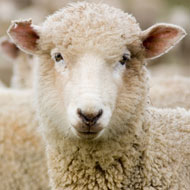Artificial intelligence used to detect sheep pain

Severe pain in sheep is associated with conditions such as foot rot and mastitis, which are both common in large flocks.
An artificial intelligence (AI) system designed to detect sheep pain could improve animal welfare and aid the diagnosis and treatment of common, painful conditions.
The system, developed by scientists at the University of Cambridge, uses five facial expressions to determine if a sheep is in pain, and to estimate the severity of that pain.
Building on earlier work that teaches computers to recognise emotions and expressions in human faces, the system detects distinct parts of a sheep’s face and compares it to a standardised measurement tool, the Sheep Pain Facial Expression Scale (SPFES).
According to SPFES, five key things happen to a sheep’s face when it is in pain: the eyes narrow, cheeks tighten, ears fold forward, lips pull down and back, and the nostrils change from a U shape to a V shape. The scale then ranks these traits from one to 10 to determine the severity of the pain.
SPFES has been shown to recognise pain with high accuracy, but training people to use it can be time-consuming and individual bias may lead to inconsistent scores. Cambridge scientists used it as the basis for the AI system in order to improve the accuracy of pain detection.
To train the AI model, they used a small dataset of around 500 sheep photographs that had been gathered by veterinary surgeons during the course of providing treatment. Early tests show that the model is able to estimate pain levels with about 80 per cent accuracy, but much larger datasets are now needed to make it more robust.
Going forward, researchers plan to train the system to detect and recognise sheep faces from moving images, including when the sheep is not looking directly at the camera. If this is successful, they may be able to position cameras at water troughs or other areas where sheep congregate, and the system would be able to recognise any sheep in pain.
Severe pain in sheep is associated with conditions such as foot rot and mastitis, which are both common in large flocks. Reliable and effect pain assessment would aid early diagnosis, leading to faster treatment and pain relief. Scientists say the system could even be rolled out to other species.



 The Veterinary Medicines Directorate (VMD) is inviting applications from veterinary students to attend a one-week extramural studies (EMS) placement in July 2026.
The Veterinary Medicines Directorate (VMD) is inviting applications from veterinary students to attend a one-week extramural studies (EMS) placement in July 2026.